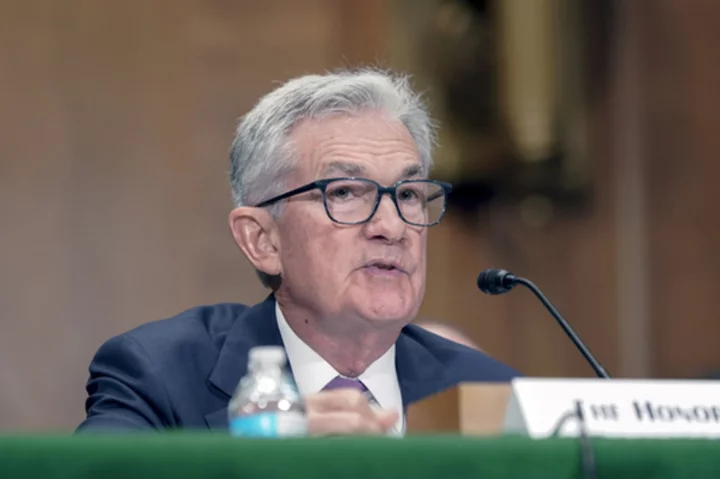WASHINGTON (AP) — Chair Jerome Powell reiterated Thursday that the Federal Reserve will likely raise interest rates at least once more this year because of persistently high inflation in the economy's service sector and the surprisingly tight job market.
Speaking to a Senate committee, Powell noted that “inflation has moderated somewhat since the middle of last year." Still, the Fed chair stressed, “inflation pressures continue to run high.”
Powell was testifying to the Senate Banking Committee on the second day of semi-annual testimony to Congress. On Wednesday, he addressed the House Financial Services Committee and sounded a similar message that some further rate hikes are likely coming this year.
On Thursday, Powell noted that “nearly all'' Fed policymakers ”expect that it will be appropriate to raise interest rates somewhat further by the end of the year.''
In May, consumer prices were up 4% in May compared with 12 months earlier, down from a year-over-year peak of 9.1% in June 2022, but still double the Fed's 2% inflation target.
The central bank has raised its benchmark rate aggressively since March 2022 in a push to slow the economy and reduce inflationary pressure. At their meeting last week, the Fed's policymakers kept their key rate unchanged after 10 straight hikes, buying time to see what impact higher rates are having on the economy. But the rate increases may resume after a pause: Twelve of 18 Fed policymakers last week indicated that they envision at least two more rate hikes this year.
Rising rates have slammed the U.S. housing market, with its dependence on mortgage rates, which have risen substantially since the Fed unleashed its anti-inflation campaign.
But higher rates take longer to have an effect on business and prices in services industries, like hotels, bars and restaurants, where labor costs weigh heavily. And the job market has been remarkably resilient in the face of increased borrowing costs. Employers have added a healthy average of 314,000 jobs a month so far this year. And at 3.7%, the U.S. unemployment rate is still near a half century low.
"Labor demand still substantially exceeds the supply of available workers,'' Powell said.
The Fed has expressed concern that an overly tight labor market puts upward pressure on wages — and on inflation.
In his remarks to the Banking Committee, Powell noted signs that the labor market is cooling though still hot by historic standards. Monthly job openings are down from a record to 12 million in March 2022 to 10.1 million in April this year. The Fed's policymakers hope to see the job market slow relatively painlessly, with employers advertising fewer openings rather than cutting many jobs.
Workers, as a whole, may finally be getting some relief from higher prices. Hourly wages rose faster than inflation last month for the first time since March 2021, according to the Labor Department.
Inflation wasn’t the only focus of the senators Powell addressed on Thursday. The committee's Republicans also criticized the Fed for considering raising the level of capital that banks must hold as a buffer against losses, in response to three big bank failures this year.
They senators noted that banks have sharply increased their capital buffers since the financial crisis of 15 years ago.
“How much is too much?’’ asked Sen. Tim Scott of South Carolina, the committee's top Republican. “The higher the capital standards, the less capital for the private sector.’’
Powell noted that nothing has been finalized and suggested that any higher capital standards would likely apply only to large banks — those with assets above $100 billion.

